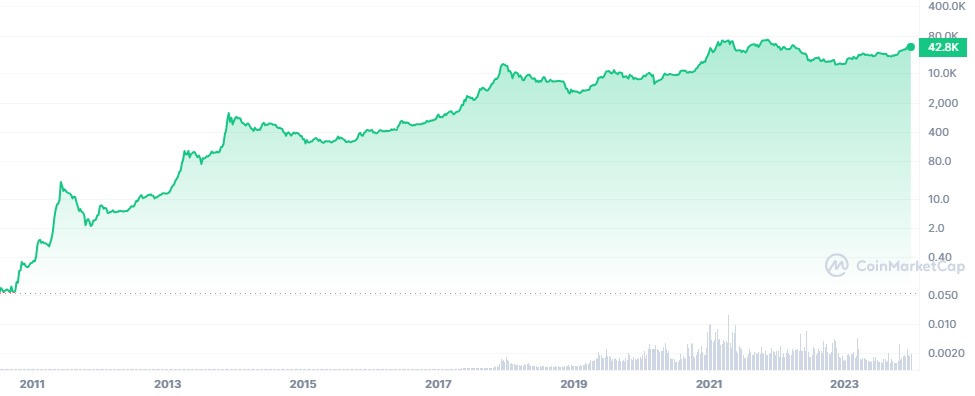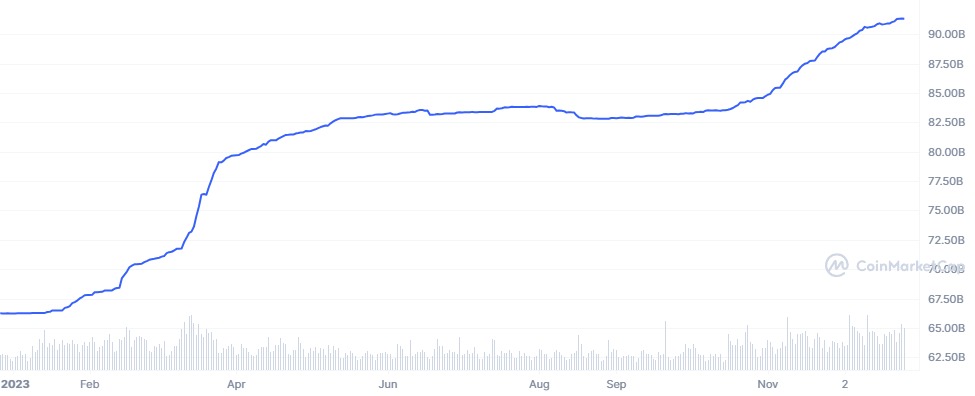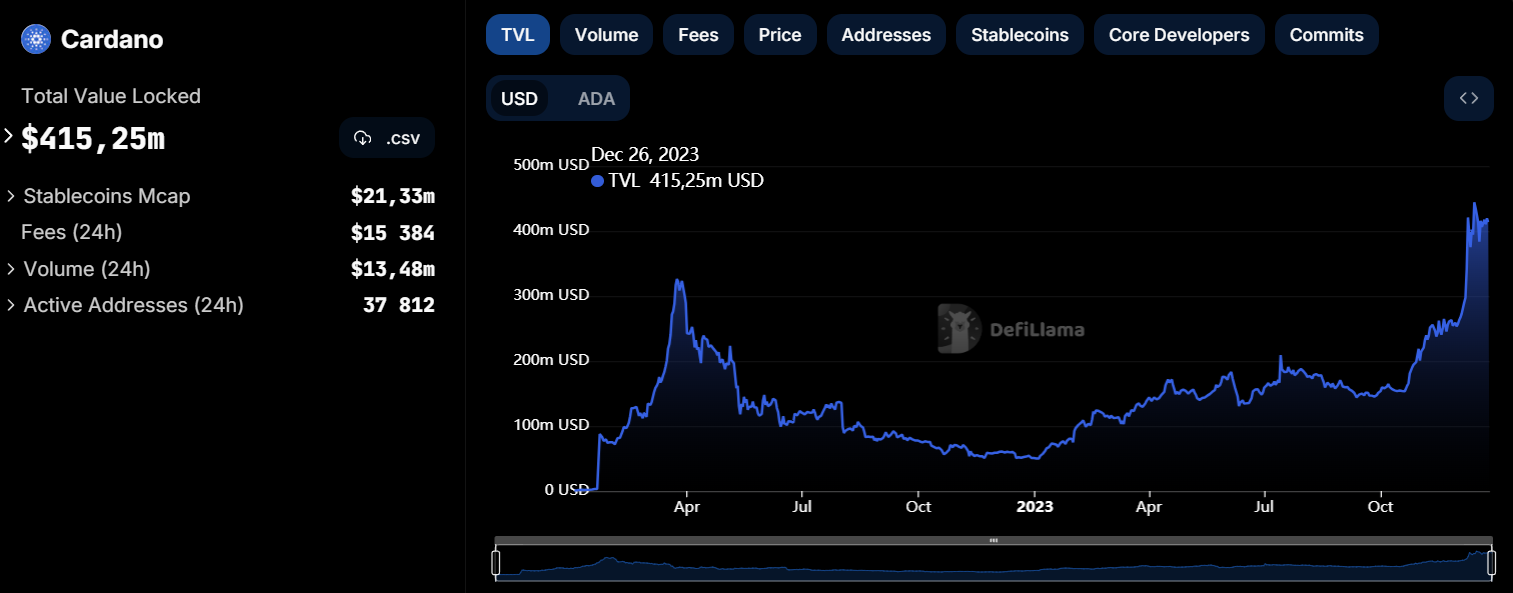In this guide, we are going to discuss some large-cap cryptocurrencies that might be worth the attention of newbies and pro investors. As the crypto segment is gaining momentum after the 2021-2022 crypto winter, large-caps are among the most obvious opportunities on digital asset markets.
Top cryptos to watch in 2024: Highlights
The largest cryptocurrencies by market capitalization are responsible for over 85% of the aggregated crypto sphere market cap.
- While low-cap and mid-cap altcoins can provide more lucrative investment opportunities, the largest cryptocurrencies by market cap are less volatile and, therefore, more predictable on every stage of the crypto market cycle.
- Bitcoin (BTC) is likely to remain the largest crypto by market cap; the community is waiting for a new rally to happen in 2024-2025.
- Ethereum (ETH) will retain its status as the largest smart contracts platform of paramount importance for the entire DeFi ecosystem.
- The status of potential securities in U.S. jurisdictions will not affect the popularity of Cardano (ADA), Solana (SOL), Avalanche (AVAX), Chainlink (LINK) and so on, while Polygon (MATIC) will be replaced by POL as the core token of the Polygon ecosystem.
- U.S. Dollar Tether (USDT) and USD Coin (USDC) will likely remain the two dominant stablecoins, though USDC might be replaced by Dai (DAI), the largest decentralized stablecoin.
- The legal statuses of XRP and Binance Coin (BNB) are now much more optimistic than a year ago as Ripple and Binance teams managed to get by with little blood in the savage battles with U.S. regulators.
- Core cryptocurrencies of leading Ethereum-based L2 platforms Arbitrum (ARB) and Optimism (OP) will remain in the spotlight for the global community.
- Despite the fact that the craziest days of the meme coin frenzy are gone, Dogecoin (DOGE) and Shiba Inu (SHIB) will keep their audiences.
At the same time, we might not be aware of “the next big things” of the upcoming big bull run: Dozens of projects with solid fundamentals and aggressive marketing are yet to be revealed to the general public.
What are cryptocurrencies?
Cryptocurrencies are digital or virtual currencies that use cryptography for security and operate on a decentralized network or blockchain. Technically, a blockchain is a sort of distributed database that records and verifies transactions across multiple computers.
Cryptocurrencies are distinct from traditional fiat currencies as they are not regulated by a central authority, offering a form of financial autonomy and privacy. They can be used for a variety of purposes, including investment, remittances and as a means of payment. The value of cryptocurrencies can be highly volatile, and their legal status varies across countries. Since the inception of Bitcoin in 2009, cryptocurrencies have sparked significant interest and debate regarding their impact on the global financial system.
What is Bitcoin?
Bitcoin (BTC) is the first blockchain and, therefore, the first-ever cryptocurrency. It was invented in 2008 by an unknown person or group using the pseudonym Satoshi Nakamoto. The Bitcoin (BTC) vision was realized in 2009, when its implementation was released as open-source software.
Bitcoin (BTC) operates on a peer-to-peer network, allowing users to transact directly without an intermediary like a bank. Transactions are verified by network nodes through cryptography and recorded on a public ledger called a blockchain. The Bitcoin (BTC) supply is capped at 21 million coins. Its security and integrity are preserved by a sophisticated process dubbed Bitcoin (BTC) mining or finding hashes of Bitcoin (BTC) blocks by high-performance computers.
What are altcoins?
Altcoins (short for “alternative coins”) should be referred to as cryptocurrencies other than Bitcoin (BTC). They emerged after Bitcoin's (BTC) success, offering variations or improvements on its technology and use case. Altcoins vary widely in their purposes, from replicating Bitcoin's model with slight changes to providing completely new functionalities, such as smart contracts, privacy enhancements, or different consensus mechanisms like proof-of-stake.
Ethereum (ETH) was the first mainstream altcoin with programmable functions. Some altcoins aim to address perceived limitations of Bitcoin, such as transaction speed or energy efficiency.
Top cryptos to watch in 2024: Full list
In the following index, we are going to display some cryptocurrencies with obvious potential in 2024 and demonstrate their pros and cons.
Bitcoin (BTC) in 2024
Bitcoin (BTC) is the first cryptocurrency and the largest digital asset by market capitalization. Despite being surpassed technically by the majority of altcoins in terms of speed, throughput and resource-efficiency, Bitcoin (BTC) remains the dominant cryptocurrency. In the past years, it evolved into a mature asset compared to Gold, S&P500 Index and so on.
 BTC CoinMarketCap">
BTC CoinMarketCap">In 2024, Bitcoin (BTC) is set to undergo its fourth halving: Block rewards for miners will be reduced by 50%. This means that BTC as an asset becomes scarcer than ever before. Typically, such events (in 2016 and 2020) were interpreted as bullish catalysts for the Bitcoin (BTC) price. Also, the potential approval of a Bitcoin-based ETF in the U.S. might catalyze a new phase of capital injection into the asset.
Ethereum (ETH) in 2024
Launched in 2015, Ethereum (ETH) is the largest smart contracts platform. It means that it acts as a distributed computations platform for decentralized applications, a class of cryptocurrency software programs. Although Ethereum (ETH) is lagging behind many of its analogues when it comes to transactional throughput, it still retains the status of the safest and longest-running blockchain for dApps. Also, it is the backbone of L2 solutions’ ecosystem.
In 2024, Ethereum (ETH) will see the activation of EIP 4844 or “proto-danksharding,” an upgrade that will increase throughput and lower transaction costs by 600%. Also, the implementation of “account abstraction” and zero-knowledge technologies on Ethereum (ETH) is underway. As a result, the community is optimistic about its midterm prospects.
Tether (USDT) in 2024
U.S. Dollar Tether (USDT) by Tether Limited is the largest stablecoin, i.e., cryptocurrency with its price pegged to the U.S. dollar. It is minted by a centralized entity that controls the basket of assets that is “backing” the circulating USDT supply. As of printing time, its market cap exceeded a whopping $90 billion.

In 2023, USDT made its portfolio way more conservative: It increased the share of cash and its equivalents and U.S. T-bills. This results in stability of USDT, but the platform remains unaudited. Tether (USDT) only publishes “attestations” to prove sufficiency of reserves.
Polygon (MATIC) in 2024
Polygon (MATIC) initially launched as the first mainstream second-layer platform on top of Ethereum (ETH): It bundles multiple transactions into a single data structure before validating them on the Ethereum (ETH) mainnet. This allows Polygon (MATIC) users to enjoy Ethereum’s level of stability and reliability, but paying reduced fees and at a much higher speed.
In 2024, Polygon (MATIC) will remain the leader of L2 innovation on Ethereum: It acquired a number of zero-knowledge tech startups to offer the most secure and cost-efficient experience. At the same time, within the massive Polygon 2.0 upgrade, the MATIC asset will be replaced by POL, a token for Polygon's staking design.
Binance Coin (BNB) in 2024
Binance Coin (BNB) is the core native cryptocurrency of Binance (BNB), the largest cryptocurrency exchange in the world, and BNB Smart Chain, an Ethereum-like smart contracts platform. Initially launched on Ethereum (ETH) for Binance ICO, it then migrated to the native blockchain and is now used as a utility token and an optimal fees instrument on Binance (BNB).
The BNB price in 2024 will be affected by the outcome of the legal battle between former Binance CEO Changpeng “CZ” Zhao and U.S. regulators. In November 2023, Changpeng Zhao agreed to pay record-breaking fees and step down as CEO. However, the verdict on his personal trial is yet to be announced.
Dogecoin (DOGE) in 2024
Launched back in 2013 as a fork of Litecoin (LTC), Dogecoin (DOGE) is the first-ever memetic cryptocurrency. It means that it is based on a semi-ironic ethos and a funny narrative instead of innovation and tech disruption. Dogecoin (DOGE) commemorates Kabosu Shiba Inu dog from the 2013 internet meme.
 DOGE">
DOGE">As the new spike of Dogecoin (DOGE) popularity was triggered by shilling on Elon Musk’s accounts, announcements of Starlink, Starship, X and Tesla products might catalyze new rallies of the Dogecoin (DOGE) price in 2024. At the same time, just like many other meme coins, Dogecoin (DOGE) is subject to increased volatility.
Cardano (ADA) in 2024
Cardano (ADA) is the second-largest proof-of-stake (PoS) network and one of the most decentralized blockchain networks in the Web3 segment by various indicators. Introduced by Charles Hoskinson in 2017, Cardano (ADA) released staking and smart contracts in the previous bull run.

For Cardano (ADA), the upcoming rally will be the first one it will meet equipped with a growing dApps ecosystem. Despite much criticism from Ethereum (ETH) maximalists, it gained traction in the NFT and DeFi segments. The net TVL of Cardano-based dApps exceeds $255 million, getting closer to multi-month highs.
XRP in 2024
XRP, the core native cryptocurrency of the XRP Ledger blockchain is a veteran digital asset known since 2012. Its popularity is associated with Ripple Inc., a U.S.-based fintech heavyweight. Ripple uses XRP as a medium of exchange in its numerous cross-border payments systems known as “on-demand liquidity corridors.”
Since December 2020, Ripple and its directors have been accused of illegally selling unregistered securities to U.S. citizens in the form of XRP. However, as Ripple scored a major legal win in Q3, 2023, the prospects for the XRP price in 2024 might be optimistic. At the same time, the process is very far from being over.
Optimism (OP) in 2024
Optimism (rebranded as OP Mainnet in 2023, but still known under its initial name) is one of the largest second-layer platforms on top of Ethereum (ETH). It means that it indexes transaction data and verifies it on the Ethereum (ETH) mainnet in compressed form to save its computational capacity.
Despite the savage rivalry in the L2s segment, Optimism remains a smart bet for dApps thanks to low transactional fees, detailed documentation and the “network effect.” Also, its team released OP Stack, an instrument for the development of Optimism-like commercial blockchains by third parties.
Solana (SOL) in 2024
SOL is the native cryptocurrency of the Ethereum (ETH) rival Solana, a proof-of-history blockchain launched in 2019. Thanks to advanced tech design, it can process thousands of transactions per second for negligible fees. At the same time, in the past, the network went through a series of painful outages and received strong criticism.
In 2024, Solana (SOL) is expected to get rid of its “FTX Legacy”: Many products incubated by FTX and its associated trading platform Alameda Research were running on Solana (SOL). As such, SOL might be in the spotlight for the next bull run as it has managed to keep its large and passionate community.
Shiba Inu (SHIB) in 2024
Launched in August 2020 by an anonymous team, Shiba Inu (SHIB) is the second largest meme cryptocurrency inspired by the success of Dogecoin (DOGE). The token started as a typical “meme coin,” but step by step it evolved into a full-stack ecosystem with its own exchange, dApps and even a native Polygon-like L2 blockchain.
At the same time, the success of SHIB in 2024 will depend on the overall status of meme coins. Major technical and community announcements might catalyze the SHIB price as well as periodical token burn reports, but these spikes are unlikely to be sustainable.
USD Coin (USDC) in 2024
Developed by U.S. conglomerate Circle, USD Coin (USDC) is the second largest USD-pegged stablecoin. As of early 2024, its market capitalization equals $24.4 billion in equivalent. The USDC cryptocurrency is natively available on all mainstream smart contract platforms and is listed by top cryptocurrency exchanges.
USDC's capitalization started shrinking in March 2023 amid rumors about its fund insufficiency caused by the insolvency of Silvergate and other crypto-friendly banks in the U.S. At the same time, in Q3-Q4, 2023, the team of the stablecoin made a number of hyped tech announcements, so USDC will likely remain a reliable modern alternative to Tether (USDT).
Arbitrum (ARB) in 2024
Arbitrum (ARB) by Offchain Labs is a dominant second-layer platform on top of Ethereum (ETH). It is responsible for over 51% of all value deposited to second-layer platforms on top of Ethereum (ETH). Hundreds of dApps have been deployed to Arbitrum (ARB) since its launch in mainnet in August 2021.

In general, the Ethereum (ETH) community is optimistic about the prospects of the Arbitrum (ARB) price for 2024. The token underpins the leading L2 platform that recently introduced Arbitrum Stylus, a protocol designed to move the Arbitrum (ARB) blockchain beyond the Solidity programming language. With Stylus, developers of Rust and C++ will also be able to run their dApps on Ethereum Virtual Machine.
Tron (TRX) in 2024
Launched in mainnet in 2018, Tron (TRX) was the second-largest blockchain by TVL behind Ethereum (ETH) for years. It gained popularity thanks to very cheap transactions, fast block finality and stable performance. Tron (TRX) is part of the ecosystem of cryptocurrency services associated with Justin Sun, who is also the owner of BitTorrent and the HTX exchange (formerly Huobi).
In 2024, Tron (TRX) will remain the dominant blockchain for USDT transfers: Over 50% of the aggregated USDT supply is issued on top of the Tron (TRX) blockchain. Meanwhile, Justin Sun will face severe legal pressure in 2024: Troubles with U.S. regulators might be an obstacle for TRX's growth.
Chainlink (LINK) in 2024
Chainlink (LINK) is the first-ever decentralized network of blockchain oracles. It facilitates the transfer of data between on-chain applications (dApps) and off-chain systems (weather trackers, points of sales and so on). As such, Chainlink (LINK) is a critically important service for integrating blockchains into real-world economies. LINK, the core native cryptocurrency of Chainlink (LINK), gained much traction in the 2020-2021 bull run.
In 2024, Chainlink's (LINK) growth might yet again be catalyzed by an array of solid partnerships or an aggressive social media promotion campaign by “LINK marines,” a group of passionate Chainlink (LINK) supporters.
Top cryptos for 2024: Numbers
Let’s summarize basic information about the most popular mainstream crypto coins to watch in 2024: names, tickers, price performance, market capitalization.
|
N |
Name |
Ticker |
Market Cap, B USD |
Down from ATH, % |
|
1 |
Bitcoin |
BTC |
833 |
38.4 |
|
2 |
Ethereum |
ETH |
269 |
54.1 |
|
3 |
Tether |
USDT |
92 |
N/A |
|
4 |
Polygon |
MATIC |
8 |
69.6 |
|
5 |
Binance Coin |
BNB |
46 |
56.6 |
|
6 |
Dogecoin |
DOGE |
13 |
87.4 |
|
7 |
Cardano |
ADA |
22 |
80.2 |
|
8 |
XRP |
XRP |
34 |
81.7 |
|
9 |
Optimism |
OP |
3 |
13.3 |
|
10 |
Solana |
SOL |
48 |
56.9 |
|
11 |
Shiba Inu |
SHIB |
6 |
87.5 |
|
12 |
USD Coin |
USDC |
25 |
N/A |
|
13 |
Arbitrum |
ARB |
2 |
84.7 |
|
14 |
Tron |
TRX |
9 |
54.9 |
|
15 |
Chainlink |
LINK |
9 |
71.1 |
In total, the aggregated capitalization of the cryptocurrency segment is $1.73 trillion, which is 43.2% lower compared to the all-time high registered in November 2021.
Wrapping up
The cryptocurrency segment meets 2024 with cautious optimism. In general, the segment is waiting for the approvals of Bitcoin and Ethereum spot ETFs, the fourth Bitcoin (BTC) halving, the EIP 4844 upgrade on Ethereum, the MATIC-to-POL migration in Polygon, the end of legal battles Binance, Ripple and Tron are involved in. The outcomes of these processes might either trigger the next bull run or ruin it.
The meme coin segment might be overshadowed by new trending narratives (real-world assets, liquid staking, AI coins and so on), while stablecoins will struggle with macroeconomic uncertainty and regulatory hostility.
 u.today
u.today
